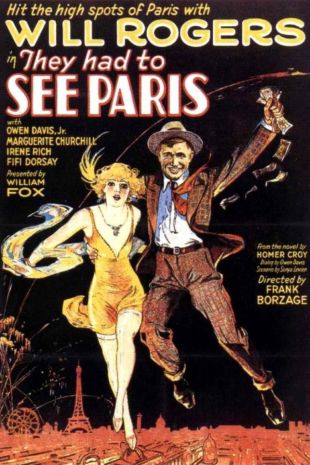
The usual impression of talkies from the early days is that they're static and creaky, and to some extent that's true. But Frank Borzage, who was as new to the sound film medium as anyone, makes They Had To See Paris work, and in a way that keeps it entertaining 80 years later. He mostly plays to the strength of the movie's biggest asset, Will Rogers, who is so thoroughly ingratiating a presence that he even acknowledges the presence of the camera and gets away with it -- you're watching a Will Rogers movie, after all, and his character is so central to the movie, that even when he seems to step out of it, he isn't really. The other players are also noteworthy, Marguerite Churchill beguilingly sweet as his marriageable daughter, Irene Rich as his wife, and Owen Davis Jr. (son of the movie's screenwriter) as his son, plus Fifi D'Orsay as a saucy French entertainer, and Edgar Kennedy as one of Rogers' Oklahoma cronies. Chester Lyons and Al Brick's cinematography holds up well, despite the static nature of shooting at this point -- only the exteriors and wide shots show much movement of the camera. And capturing sound was still obviously a challenge, as evidenced by the live sound echo in Rogers' early scenes, the director and editor Margaret V. Clancy try to compensate for the static shooting, and do succeed with help from Rogers' performance, his humor keeping things moving even when the camera can't. As to the story, it will seem familiar to anyone who has seen Dodsworth with Walter Huston and Ruth Chatterton, about Americans who go abroad and find themselves changed by the experience -- except that there's a happier ending here, for those who like enduring marriages. And that fits in with Borzage's essentially romantic vision of life and love.
